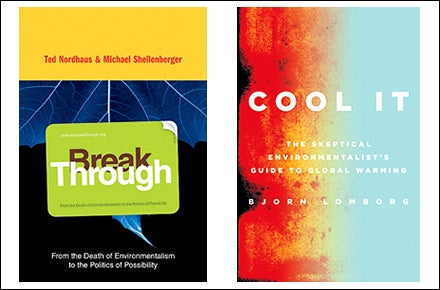WITH STALWARTS from George W. Bush to the suits at ExxonMobil now admitting that human habits are inching up the mercury, the battle about climate change is finished, right? Well, no. The debate over what to do next is proving as contentious as any we have seen so far. Some of the strongest opinions are coming from somewhat controversial figures, in a cluster of books hitting stores this fall.
Want it? Get it.
Buy , , and on Amazon.com.
Former Speaker of the House Newt Gingrich lays out his earth-saving agenda in A Contract with the Earth (Johns Hopkins, $20), co-written with Georgia Tech’s Terry L. Maple (see “Red Goes Green,” page 80). Rejecting the notion that “free enterprise and environmentalism are opposing forces,” the authors propose a ten-point plan to protect both the environment and the economy, with entrepreneurialism—and little government regulation—at its core. “The world can be changed faster by the spread of brilliant ideas than by any plodding bureaucracy,” they write. “And we gladly put our faith in such intellectual and social processes.” This “richer is greener” ethos takes up much of the book, with the authors extolling cooperation between the public and private sectors. They cite, for example, a partnership between Ford Motor Company and Conservation International to promote eco-leadership in business, and the Dutch government’s tax incentives for those who invest in cutting-edge alternative-energy projects. There’s little quantitative evidence among these feel-good anecdotes, however, that market forces alone can stop ecological meltdown.
Shaking it up from the left are Ted Nordhaus and Michael Shellenberger, green consultants best known for their inflammatory 2004 essay “The Death of Environmentalism.” In this follow-up book, Break Through: From the Death of Environmentalism to the Politics of Possibility (Houghton Mifflin, $25), they contend that greens won’t make a dent in global problems until they embrace the promises of technology and stop asking people to do without. Too often, they write, environmentalists “speak to the need to limit and even sacrifice individual and collective aspirations.” Instead they advise stealing some moves from Christian evangelicals, who’ve risen to political prominence by trading doomsaying for community building. A few of their points will have Muirites steaming. The authors assert, for instance, that Al Gore is primarily a fearmonger, and that eco-justice advocates “see conspiracies that don’t exist.” But their overall message—that enviros “must choose between a resentful narrative of tragedy and a grateful narrative of overcoming”—will resonate with even dedicated tree huggers.
That won’t include Danish statistician Bjorn Lomborg, whose 2001 book The Skeptical Environmentalist inspired a cottage industry of Lomborg bashing. In Cool It: The Skeptical Environmentalist’s Guide to Global Warming (Knopf, $21), he argues that things will never be as bad as worrywarts suggest. “The broader problem with the climate-change concern,” he writes, is that “once you look closely at the supporting data, the narrative falls apart.” According to his cost-benefit analyses, massively curtailing CO2 emissions is futile; our money would be better spent on antipoverty initiatives. He insists that a one-foot rise in sea levels over 100 years will be a minor inconvenience. And if the planet warms 4.7 degrees by the year 2100, as UN experts predict, we may be better off: Cold kills more people than heat does. As critics point out, Lomborg cherry-picks best-case-scenario statistics, so his views seem a bit too rosy. Yet he’s right to suggest that we consider the economic and social factors behind ecological problems. Like all the books here, Cool It will help broaden the scope of our climate-change discussions. But we better read fast. The next time we look up from buying carbon offsets, we don’t want to realize that we’ve passed a point of no return.


